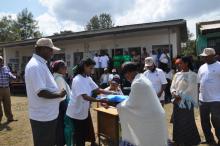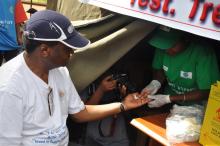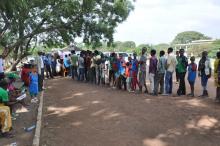World Malaria Day celebrated in Ethiopia
The eighth World Malaria Day was celebrated for the eighth time on 25 April 2015 in Hawassa, Southern Nations, Nationalities and Peoples’ Region (SNNPR) in a colorful event that called for renewed commitment and increased investment towards Malaria control and elimination. The message of this year’s World Malaria Day is, “Invest in the Future. Defeat Malaria.” Present at the event were the SNNP Regional Government, Federal and Regional bodies of the Ministry of Health, partners in malaria control, UN agencies – WHO and UNICEF and elders and representatives of the community.
The days' activities included malaria testing as part of the 3 T's (testing, treating tracking), and a call for action through a chilren's drama at the main event in Hawassa, as well as distribution of insecticidal bed nets and household visit at Ramada Kebele of Shebedino Woreda.
Malaria is an ancient disease that has lived with humanity as long as humanity itself. A widespread and potentially lethal human infectious disease, malaria has infested every continent on earth except Antarctica. It is caused by parasitic protozoans that are transmitted through the bites of infected mosquitoes. The disease is characterized by well-known symptoms such as debilitating fever, shaking chills, rigor, joint pains, and nausea and vomiting. The disease has caused and is causing incalculable amounts of death, sickness, suffering, economic and social disruption, poverty and human misery wherever it is prevalent. It is suspected that the disease has killed millions of human beings from the face of earth. History tells us that powerful empires and states have collapsed due to malaria. Closer to home, we have witnessed villages and communities wiped out because of malaria.
While huge gains in the fight against malaria have been made in recent years, the disease still has a devastating impact on people’s health and livelihoods around the world, particularly in Africa, where it kills almost half a million children under 5 each year. According to the WHO World Malaria Report, in 2013 malaria has caused illness in about 198 million people and an estimated 584,000 deaths globally, but mostly among African children.
Despite the challenges posed by malaria, significant achievement has been made in the last 15 years since 2000: Malaria mortality rates have fallen by 47% globally and by 54% in the WHO African Region. Ethiopia has made, and is making, commendable efforts to control malaria, and as a result of these efforts reported cases, deaths and epidemics have declined significantly in the past decade.
The World Health Organization is calling for high-level commitment to the vision of a world free of malaria. The theme, set by the Roll Back Malaria Partnership, is Invest in the Future: Defeat Malaria. This reflects the ambitious goals and targets set out in a draft post-2015 strategy to be presented to the World Health Assembly in May 2015. The new strategy aims to reduce malaria cases and deaths by 90% by 2030 from current levels. Four countries have been certified free of malaria in the last decade and the post-2015 strategy sets the goal of eliminating the disease from a further 35 countries by 2030.
World Malaria Day is an opportunity to highlight the advances that have already been made in malaria prevention and control, and to commit to continued investment and action to accelerate progress against this deadly disease.
For more information on World Malaria Day, follow this link: World Malaria Day
Or contact: Dr Worku Bekele, Malaria Control Program Officer, WHO Ethiopia; E-mail:workub [at] who.int
Photos : WHO Ethiopia/ Loza Mesfin







